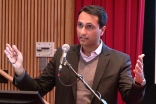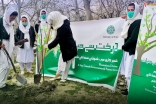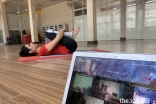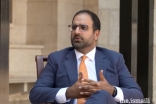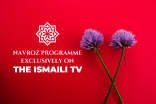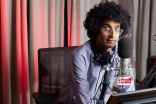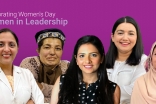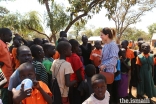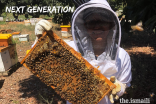Content Tagged with Community
Health can be defined as a state of physical and mental wellbeing. While there are many ways to achieve this state, sport is a globally recognised medium that facilitates healthy lifestyles. Created in 2020, The Sportshow is a series on The Ismaili TV that promotes dialogue with Ismaili talent in the field of sport worldwide. Based on the show, here are the unique stories of three accomplished, skilled, and inspiring Ismaili athletes.
Ismailis from different parts of the world have stepped up to support their communities and help each other maintain their health and overall wellbeing during the pandemic.
One year ago, The Ismaili launched an online TV channel, supported almost entirely by a team of dedicated volunteers, in an effort to fill the void that the pandemic left in the lives of the global Jamat.
Covid-19 has changed much of what we do and how we do it; from shaking hands and hugging our friends, to the very way we learn and work with our peers and colleagues. At the same time, Covid-19 has given rise to CONNECT, an initiative of Global Encounters and Aga Khan Youth and Sports Boards from around the world. Taking the form of a virtual camp, CONNECT is a way for Ismaili students to build bonds no matter where they may come from. CONNECT will be returning this summer from 19-25 July and 2-8 August.
This week, on our sixth episode of Trailblazers, we are joined by Dr Eboo Patel, the founder and president of Interfaith Youth Core (IFYC), a nonprofit organisation based in Chicago that prepares youth to become interfaith leaders in a changing environment. Eboo was also a member of President Barack Obama’s inaugural advisory council on faith-based and neighborhood partnerships. A Rhodes scholar with a doctorate in sociology from Oxford University, Eboo has authored four books, with a fifth on the way. In recognition of his life’s work, Eboo has also been awarded numerous honorary degrees.
Ismaili CIVIC is a global programme under which the Jamat throughout the world has united around a mission to serve humanity by rendering services to improve the quality of life of the communities in which they live. This international endeavour reflects the community’s ethic of civic engagement and good citizenship, exemplifying Islam’s core values of service, peace, compassion and care for the vulnerable.
I am silent in anticipation, as adrenaline rushes through me as a music lover. I delight at the opportunity of listening to original compositions. It is for this reason that when the song Mawla Mera Ishq Tu is shared with me, I eagerly click on the link to experience the musical journey expressed through this beautiful composition.
At the opening of the Aga Khan Museum in Toronto, Canada, Prince Amyn emphasized the importance of art in our lives by noting that “art and culture can have a profound impact in healing misunderstanding and in fostering trust even across great divides.” He made this speech in 2014, although the essence of his words remains timeless.
Art has often played a powerful role in shaping society’s consciousness, especially in times of crisis. Some of the most touching moments during the early days of the pandemic were people singing or playing music for their neighbours, drawing their communities out on balconies and rooftops to share the moment. Ismaili artists from various countries share their stories of how Covid-19 impacted them and how they adapted to the new normal.
This week, on our fifth episode of Trailblazers, we are joined by Danish Dhamani, the co-founder of Orai, and one of 2021’s Forbes 30 under 30.
“Of course, Mummy,” responds Zoya Nayani, the main character of Pebbles to Penguins: A Story of Renewal. Zoya’s definite statement is not unlike the responses of many people when asked, “Are you okay?” Entrenched in the context of the pandemic — like nearly everyone else in the world — the directors of Pebbles to Penguins are committed to uncovering the psychological subtext of these conversations.
This week, on our fourth episode of Trailblazers, we are joined by Rahim Daya, CEO of Barclays Private Bank, Switzerland, as well as the head of Middle East at Barclays. Based in Dubai, Rahim is responsible for the management and strategy of Barclays, Middle East, and is a drummer for the band, Khayal, having performed all across the globe, including at the Diamond Jubilee Celebration in Lisbon in 2018.
Today we share a story about two children, Nargis and Aziz, who celebrate the festival of Navroz with their family. Parents and grandparents may wish to read this story with children, whether in person or over a video call.
Next weekend, the Jamat around the world will celebrate Navroz, marking the beginning of a new year and the first day of spring. The Ismaili TV is pleased to present a two-day Navroz programme featuring programmes in multiple languages for children and adults alike.
This week, on the third episode of The Ismaili TV’s Trailblazers, we are joined by Latif Nasser, the host and executive producer of the Netflix documentary series ‘Connected: The Hidden Science of Everything’, and host of two podcast series’. He received a PhD in the history of science from Harvard University and is the recipient of the 2021 duPont Columbia Award for his series ‘The Other Latif’.
Art historians and enthusiasts often recognize the 10th through 13th centuries as a period that marked an increase in the usage of symmetrical, geometric patterns in the Muslim world. Most likely aided by Muslim mathematicians, artists and artisans produced a large variety of designs. Many of these geometric models developed interpretations of ornament that embody metaphysical intent.
As Diane Mariechild eloquently quoted, "A woman is a full circle; within her is the power to create, nurture and transform." With this notion in mind, ‘Women’s Day’ is celebrated annually on the 8th of March around the world. Although the initiative to celebrate Women’s Day was designated in 1909, it was not until 1977 when the United Nations officially recognized the 8th of March as a day to pay tribute to women and their achievements, regardless of their religious, ethnic, social and economic backgrounds.
Farah Williamson’s story is multi-faceted. As a 10-year-old girl, she had to flee her home country, Rwanda, during the 1994 genocide. Today, Farah is the co-founder of Project Shelter Wakadogo, a not-for-profit school in Gulu, Uganda. Farah speaks about these experiences and more in the second episode of The Ismaili TV’s original series Trailblazers.
The complex challenges facing our increasingly volatile world — from climate change to rural development to security — are also a source of opportunity for the next generation of leaders and changemakers. Around the world, young Ismailis like Rufayda Dhamani, Nurmuhammad Butabekov, and Aleem Rehmtulla are taking creative approaches to address these issues and prepare for the future of the global economy.
Trailblazers, a new original series airing exclusively on the Ismaili TV, will showcase Ismaili professionals from around the world who have demonstrated excellence in their respective fields.






